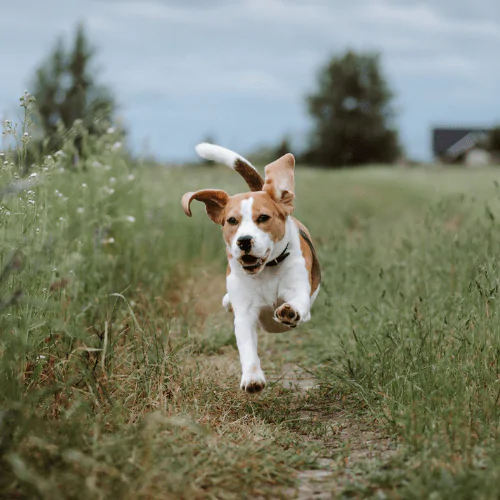
Can dogs get hayfever?

Dr Scott Miller
26 July 2023 | 5 minutes read
Ah, that pesky pollen! Many hayfever sufferers know very well the eye-itching and nose-blocking struggle each spring and summer. But what about our best canine pals?
Expert vet Dr Scott Miller shares his need-to-knows about how seasonal allergies affect dogs. Learn how to tell if your pup is sensitive to pollen and what you can do to ease their symptoms.
- Do dogs get hayfever?
> Which dog breeds are more likely to get hayfever? - Can dogs be allergic to different types of pollen?
> When are dogs most likely to get hayfever? - Dog hayfever symptoms
> How to manage your dog’s hayfever - Diagnosing dog hayfever
- What can I give my dog for hayfever?
> Can dogs have hayfever tablets?
> Home remedies for dog hayfever
> How to remove pollen from dog fur - Other dog hayfever questions
> Can I cure my dog’s hayfever?
> Can I prevent my dog from getting hayfever?
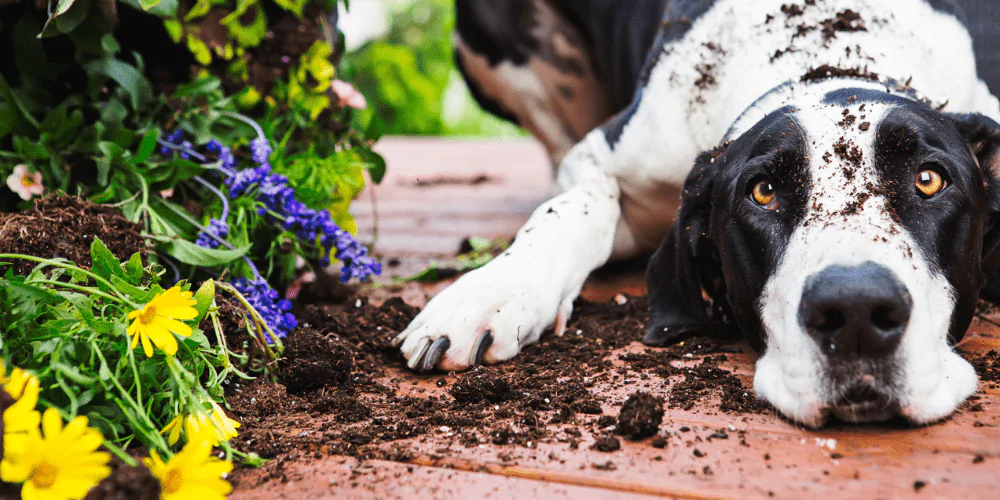
Do dogs get hayfever?
Dogs share many of the conditions that we humans do. And that includes – you guessed it – hayfever and environmental allergies.
Dogs often show signs of pollen allergies during their early years but can develop hayfever at any point in their life.
So it’s important to keep an eye on your pooch when the warmer months come around and they’re spending more time outside.
> Which dog breeds are more likely to get hayfever?
While any dog can get hayfever, certain pedigree breeds can be more prone due to their face shape, coat type, or genetic sensitivity.
This includes:
- Boxers
- Cocker Spaniels
- Golden Retrievers
- Dalmatians
- Terriers
- Irish Setters
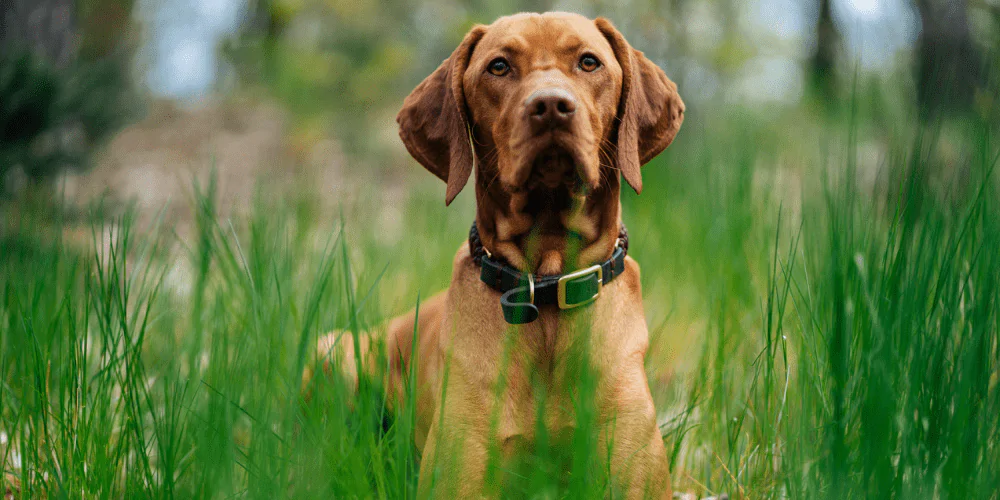
Can dogs be allergic to different types of pollen?
Dogs can indeed be affected by one or a combination of tree, grass, and weed pollen. These pollen spores float through the air and are absorbed into your pup’s bloodstream through their skin and nose. Pollen on the ground, plants, and other surfaces can also be picked up on your dog’s fur.
> When are dogs most likely to get hayfever?
Here’s when different types of pollen peak during the year and can affect your dog’s allergies:
- Tree pollen is often at its worse in March and April
- Grass pollen is usually at its highest levels between May and July.
- Weed pollen tends to peak between June and August

Dog hayfever symptoms
Hayfever symptoms can vary depending on the pollen type and your individual dog’s reaction.
Common symptoms include:
- Itching around the eyes, mouth, ears, nose, legs, paws, groin, stomach
- Sneezing
- Running nose
- Sore and flaky skin
- Rashes
- Diarrhoea
So pay close attention to your dog for signs they are:
- Excessively licking
- Biting themselves
- Rubbing their face and ears
- Acting lethargic
> How to manage your dog’s hayfever
Let’s be honest, you’re not going to be putting your dog in a hazmat suit or shutting them away during the summer months!
So instead, here’s some ways to help manage your pooch’s hayfever:
- Keep up to date with their flea and worming
- Regularly wash their bedding and blankets
- Keep your windows shut during the day to minimise pollen coming in
- Brush your dog’s fur daily
- Give them a weekly bath with sensitive dog shampoo designed to calm itchy skin (just be careful not to overdo it and dry out their skin)
- Take them for walks earlier and later in the day when the pollen count has dropped down
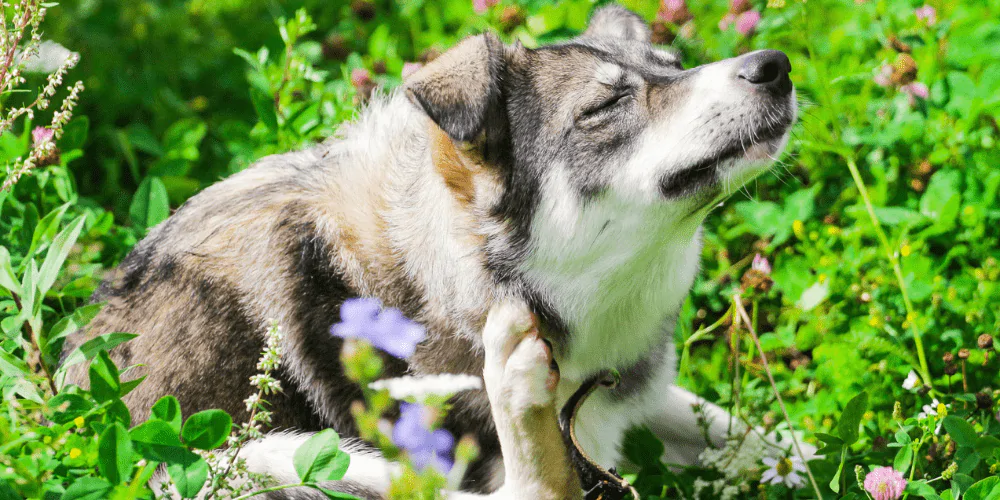
Diagnosing dog hayfever
It can be tricky to figure out if your dog has hayfever as they may be reacting to other allergies like food and dust. Some canine hayfever symptoms are also very similar to conditions like dermatitis.
To help suss out if pollen is the culprit, your vet can:
- Do a thorough physical exam on your dog
- Ask when their symptoms tend to flare up more around high pollen season
- Run serum and intradermal allergy tests to see what allergens are causing problems
- Recommend a food elimination trial to check for food intolerances
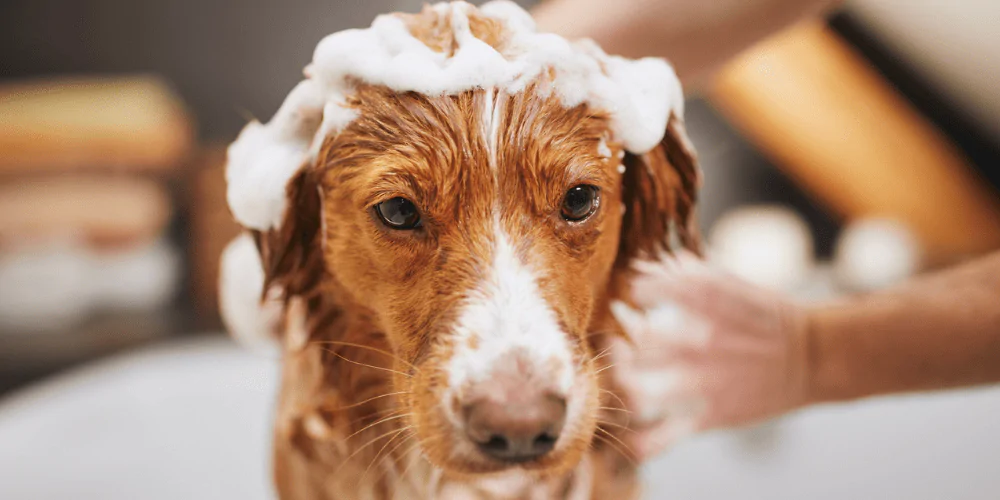
What can I give my dog for hayfever?
The good news is there’s a number of different options to help your dog’s hayfever. Your vet will recommend one or a combination of treatments for your pup’s individual needs.
This can include:
- Antihistamines
- Steroids/immuno-modulators
- Medicated shampoos, creams, and spray
- Eye and ear drops
- Immunotherapy treatment
- Supplements (to boost their skin’s natural defence barriers and so help reduce itching)
> Can dogs have hayfever tablets?
Dogs can be given hayfever tablets but only under the strict guidance of a vet. This is because it can be tricky to get the right dosage and hayfever tablets can also be toxic to some canines.
And although rare, there is the possibility of side effects like:
- Drowsiness
- Vomiting and diarrhoea
- Dry mouth and excess salivating
> Home remedies for dog hayfever
Always speak to your vet before trying any home remedies for your pup’s hayfever symptoms.
They could be unsafe for your dog, give them a bad reaction, or make any medications prescribed by your vet less effective.
> How to remove pollen from dog fur
Giving your pup’s fur a gentle wipe down after walks with a damp towel or cloth can help to remove any pollen. Remember to focus on areas like the face and paws as this is where tiny spores can get trapped.

Other dog hayfever questions
> Can I cure my dog’s hayfever?
Sadly there’s no cure for hayfever, but this won’t stop your dog from living a happy and healthy life.
It’s all about managing their symptoms and their environment as much as possible to ease the effects of pollen.
Always speak to your vet if you’re worried your dog’s hayfever symptoms are getting worse.
> Can I prevent my dog from getting hayfever?
Research has shown that introducing puppies to different types of pollen early on can help build up a resistance to hayfever symptoms.
But just like humans, there’s a chance your dog can develop allergies at any point during their life.
So keep an eye on them and speak to your vet if you notice any unusual symptoms or changes in their behaviour.
Look after your top dog throughout all seasons with flexible dog insurance from Petsure.


